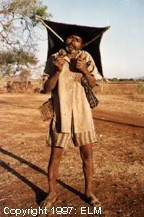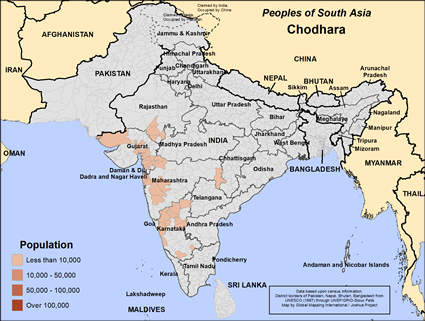Chodhara in Pakistan

Photo Source:
Bethany World Prayer Center
|

Map Source:
People Group data: Omid. Map geography: UNESCO / GMI. Map Design: Joshua Project.
|
| People Name: | Chodhara |
| Country: | Pakistan |
| 10/40 Window: | Yes |
| Population: | 2,500 |
| World Population: | 11,300 |
| Primary Language: | Sindhi |
| Primary Religion: | Hinduism |
| Christian Adherents: | 0.00 % |
| Evangelicals: | 0.00 % |
| Scripture: | Complete Bible |
| Ministry Resources: | Yes |
| Jesus Film: | Yes |
| Audio Recordings: | Yes |
| People Cluster: | South Asia Tribal - other |
| Affinity Bloc: | South Asian Peoples |
| Progress Level: |
|
Introduction / History
The Chodhara are a subgroup of the Bhil. Although the Bhil were once thought of as a single tribe, it is now clear that they consist of many subgroups, though there are five major ones.
The name "Bhil" was probably derived from the word villu or billu, which in most Dravidian languages is the word for "bow." The bow has long been a characteristic weapon of the Bhil because the tribesmen always carry their bows and arrows with them. To safeguard their independence and rule, the Bhil fought against powerful empires, the Moguls, the Maratha and the British Raj.
The Chodhara of Pakistan speak Sindhi as their first language. Some of their men also speak Urdu, the national language of Pakistan. A complete Bible and the JESUS Film are available in Sindhi.
Most Hindu Chodhara live in India while a much smaller group resides in southeast Pakistan.
What Are Their Lives Like?
The Chodhara participate in festivals alongside the Hindus who live nearby. The Chodhara give special reverence to a Hindu Mother goddess named Devi. This goddess supposedly brought them moral, social and health reforms, including vegetarianism. Today most of Chodhara eat meat except for beef.
The Chodhara use their weapons only for hunting or defending themselves against robbers or wild animals. Most of the Chodhara work as small-time farmers. Cotton, vegetables and rice are their principal crops. These are taken to the weekly markets, where they are traded for clothing and tools. They obtain supplementary foods by hunting, fishing and collecting produce from the forest.
Some Chodhara women are also employed, working as domestics for the wealthier landowners. Chodhara craftsmen such as carpenters and weavers are better off economically than those who farm. Customarily, the Chodhar only marry people within their own group. They are permitted to marry outside their direct clans. Most marriages are monogamous, and the line of descent is through the father. If a young couple wishes to marry but cannot afford the bride price, it is common for the girl to be willingly abducted by the young man. They return home after several months and have their union sanctioned.
What Are Their Beliefs?
The great majority of the Chodhari practice Hinduism heavily influenced by ethnic religions. Their folk religion takes the form of animism (belief that non-human objects have spirits) and ancestor worship (praying to deceased ancestors for guidance). They build stone memorials for dead ancestors. They believe in the gods of the hills, the clouds and the wind. They also worship a god known as Mehta, whom they believe inhabits such things as whirlwinds, thunder, lightning, the sky, and earthquakes. Mehta lives in the sea, on riverbanks and in animals. The Chodhari believe that the spirit of a person who died an unnatural or violent death will possess the body of an evil person.
What Are Their Needs?
Chodhara would benefit from solar panels and access to modern medicine. They need good schools for their children. Most of all only Christ can forgive their sins and free them from their fear of evil spirits.
Prayer Points
Ask the Lord to send Holy Spirit anointed workers to the Chodhara of Pakistan.
Pray for Jesus movements to bless extended families so the gospel will spread rapidly among this people group.
Pray for the spiritual lives of the Chodhara people to become fruitful as they follow Christ.
Pray for the lives and culture of the Chodhara people to evidence the rule and reign of God. Ask the Lord to open the hearts of the Chohara to the gospel of Christ.